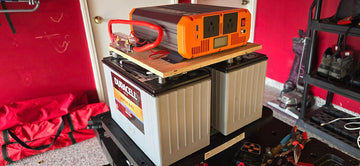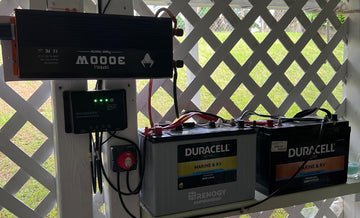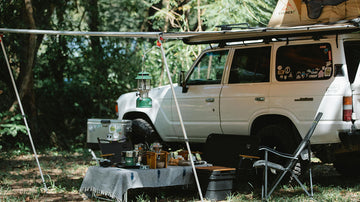The correct inverter voltage is essential for system efficiency, safety, and future scalability. In standard off-grid solar systems, RVs, or mobile power installations, choosing between 24V and 48V inverters can be a difficult decision. This article will analyze the key differences, advantages, disadvantages, and practical considerations between 24V and 48V inverters to help you make your choice.

Key differences between 24V and 48V inverters
24V and 48V inverters have different input voltages, and inverters with different voltages must be matched to the correct equipment. If your TV requires 48V, you will need to purchase a 48V inverter to operate it.
The different voltage levels have significant differences in efficiency, cost, and application.
Comparing 24V and 48V Inverters
1. Efficiency
The efficiency of an inverter is very important to the system. It refers to the rate of energy conversion from DC to AC and determines what percentage of the current is available to the load. The rest of the energy not converted is usually lost as heat.
For the same amount of power, a 48V inverter outputs half the current of a 24V inverter. Lower current means less energy lost. Especially over long distances, 48V inverters have the advantage of reducing the heat generated by the cables and extending the life of the equipment.
While 48V is typically used in large systems, 24V inverters, while less efficient, are often used in smaller systems with lower power.
2. Cable sizes
The amount of current determines the cable size, with lower currents allowing for thinner cables to be used. Using a 48V inverter reduces the wire gauge, resulting in a 25-40% reduction in material costs, and is especially friendly for space-constrained scenarios such as RV or rooftop solar.
24V inverters, on the other hand, require thicker cables that are difficult to bend and conceal, making installation more difficult.
3. cost
When choosing an inverter system, many people will first consider the initial cost. However, the difference in cost structure between a 24V and a 48V system is not only reflected in the inverter itself but also in the number of batteries, cable specifications, scalability, and many other aspects.
In terms of equipment price, 24V inverters are oriented to small and medium-sized load users, with a larger manufacturing and market volume and, therefore, lower prices. On the other hand, 48V inverters are more oriented to the middle and high-end market, with higher power capacity, more complex circuit design, and higher price. For beginners or RVers with limited budgets, the 24V is the easier choice to get started.
In terms of battery configuration, a 24V system requires only two 12V batteries in series, which is less expensive. If one of the batteries fails, only 50% of the capacity is lost, making it less expensive to replace. The 48V system requires at least four 12V batteries or a dedicated 48V lithium battery, which is a higher initial investment.
In the long run, however, 48V systems can use thinner, cheaper cables, reducing wiring and installation costs. At the same time, the higher voltage reduces energy loss and improves efficiency, saving power costs in the long run.
Finally, another cost factor that is often overlooked is scalability. While a 24V system may need to be replaced in its entirety if the user plans to upgrade the system's capacity or add more equipment in the future, a 48V system has more room for expansion and lower post-costs. From this perspective, 48V is a more “long-term” investment.
Pros and cons of 24V inverters
| Advantage | Disadvantage |
| Easy to install, suitable for DIY | Poor scalability |
| Low battery maintenance costs | High energy consumption |
| High application suitability | Low upper power limit (typically ≤5000W) |
| Low initial investment | Unsuitable for long-distance transmission (>10 meters) |
Pros
- Plug-and-play installation: A 24V system usually requires only two 12V batteries in series to work. The wiring is intuitive, making it easy for a novice to quickly set up the system, saving time and installation costs.
- High equipment compatibility: In-car refrigerators, lighting fixtures, water pumps, and other equipment are usually designed for a 12V/24V DC power supply. When using a 24V inverter, AC power (e.g., 120V AC) can be supplied directly to these devices without the need for an additional step-down converter.
- Low maintenance costs: A 24V battery pack typically consists of two 12V batteries connected in series. If a single battery fails, only the damaged unit needs to be replaced (at a cost of about 150-150-300) instead of replacing the entire battery pack.
- Suitable for small and medium power applications: For loads in the 1000W~3000W power range, such as laptops, small refrigerators, lighting, etc., the 24V inverter is more than enough to handle them.
Cons
- Higher current at high loads: 24V inverters draw more current for the same amount of power, resulting in more energy loss.
- Need for thicker cables: To prevent voltage drop and overheating, wiring requires thicker cables (e.g., 2 AWG or higher), increasing material costs and installation difficulties.
- Limited scalability: When the system needs to be upgraded to higher power or longer run times, the 24V system is difficult to support and needs to be redesigned.
Pros and cons of 48V inverters
| Advantage | Disadvantage |
| High efficiency and low loss | High up-front investment costs |
| Thinner cables are available to reduce the risk of heat generation. |
Complex installation; not friendly enough for novice users |
| Supports high-power devices |
Unsuitable for small-scale projects requiring only a small amount of power |
| Facilitates system expansion |
Complex and costly maintenance |
Pros
- Higher efficiency: 48V systems significantly reduce line losses by lowering the current (half the current of 24V for the same power).
- Reduced risk of heat: Because of the lower current, 48V systems can use thinner cables, using less copper, reducing wiring and installation costs, and avoiding safety hazards caused by high temperatures.
- Supports high-power devices: Most high-power inverters only support 48V input. Most high-power inverters only support 48V inputs, such as those used for central air conditioning, industrial motors, or solar energy storage systems, which often only offer a 48V interface.
- Enables system expansion: If you plan to add solar panels, battery capacity, or electrical loads in the future, a 48V system offers greater expansion compatibility.
Cons
- High upfront investment cost: 48V inverters, controllers, batteries, and other accessories are usually more expensive than 24V systems, so the initial budget needs to be more adequate.
- Equipment compatibility limitations: Many entry-level batteries (e.g., single 12V Li-ion battery) and solar controllers (e.g., 12/24V MPPT) don't support 48V systems and need to be replaced with specialized equipment for higher voltages.
- Not friendly enough for novice users: Installing and commissioning a 48V system involves more electrical knowledge and safety precautions and is not suitable for beginners to get started quickly.
- Complicated maintenance: 48V battery packs may cause the whole system to be paralyzed if a single battery fails and needs to be paired with an intelligent battery management system (BMS) to prevent overcharging/over-discharging.
When to choose a 24V/48V inverter?
After understanding the advantages and disadvantages of 24V and 48V inverters, you can choose according to the actual situation. The following are common 24V/48V inverter usage scenarios:
For caravans, vans, and small solar systems
In motorhome (RV) camping, van conversions, portable off-grid installations, or small to medium-sized solar systems, a 24V inverter is just what you need. These projects typically have power requirements of less than 2000W, simple system configurations, and limited installation space.
However, if you plan to use high-power devices, such as refrigerators, air conditioners, induction cookers, etc., the 24V inverter may be overloaded, so it is recommended to use 48V.
For large solar arrays
The 48V inverter is more recommended for applications with a power demand of more than 3000W, such as home off-grid energy storage systems, commercial power plants, and large solar arrays. These scenarios not only require extremely high power consumption but also longer transmission distances. 48V inverters' low current characteristics can reduce line losses.
Plan to expand your system.
If your project has future expansion needs, such as gradually increasing the number of panels, battery packs, appliances, etc., then give priority to the 48V inverter. 48V system is more compatible with high-power inverters, high-voltage lithium batteries, and MPPT controllers, avoiding the costly waste of replacing the whole system at a later stage and the wiring problems.
In summary, the 24V system is suitable for small, mobile, and budget-friendly projects, while the 48V system is suitable for high loads, long-term investments, and future expansion.
FAQ
Q: Can I upgrade from 24V to 48V in the future?
A: Yes, it is possible to upgrade from 24V to 48V at a later date, but this usually requires replacing the inverter, batteries, charge controller, and some of the wiring. To avoid duplication of investment, it is advisable to plan for future system sizing at an early stage.
Q: Will a 48V inverter drain the batteries faster?
A: No, the 48V inverter itself will not drain the batteries faster. On the contrary, it is usually more energy efficient and stable than a 24V system due to its lower current and higher efficiency. The key is the size of your electrical load, not the system voltage.
Q: Are 48V systems harder to maintain?
A: 48V systems are not necessarily more difficult to maintain, but they do require more wiring, safety, and equipment matching. As long as they are properly installed and used, the frequency and difficulty of maintenance are comparable to, if not more stable than, a 24V system.













